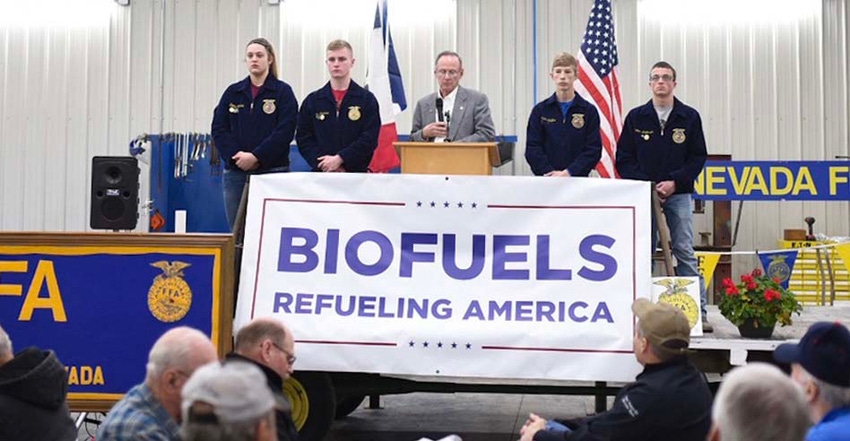March 12, 2018

Farmers, biofuel producers and other concerned citizens rallied on Saturday in Iowa to send a message to President Trump: Stand strong on your pledge to support the Renewable Fuel Standard (RFS), and reject proposals to bail out oil refiners at the expense of farmers.
Supporters of ethanol and biodiesel gathered at a farm near Nevada in central Iowa for “Refueling America”—to hear about efforts by oil-state senators in Washington, D.C. that threaten the future of homegrown biofuels and farms. Leading the campaign to dismantle the RFS is Sen. Ted Cruz (R-Texas). He wants to remove the responsibility of oil refiners to comply with the law, jeopardizing thousands of jobs and family farms across the Midwest.
The proposal—which would virtually eliminate all incentives for refiners to blend homegrown biofuels—has been the subject of recent meetings between Trump administration officials, senators and industry leaders.

LETTER TO TRUMP: All who attended the biofuel rally at the Couser farm signed a letter to President Trump, telling him to stand strong with farmers and rural America and maintain a strong biofuels policy.
Asking the president to keep his promise
“We need President Trump to hear from you. He’s heard from Ted Cruz. Now he needs to hear from rural America,” said Bill Howell, who manages the Poet ethanol plant at Coon Rapids in western Iowa. “We heard the President campaign here in Iowa and elsewhere, promising he would preserve the RFS and stand with farmers. This is his opportunity to do that. We’re calling on President Trump to keep his promise.”
With low commodity prices, farmers are facing a fourth straight year of income decline. Land values continue to drop and farm debt is rising. A study released last week by Iowa State University economists shows the Cruz oil refinery bailout plan would decrease corn prices by another 25 cents per bushel. It would decrease soybean prices by 16 cents.
“Folks in Washington forget that American-made biofuels play a pivotal role in our economy,” Howell said. “Biofuels support jobs and wages in rural communities. Biofuels grow domestic and international markets for ag commodities. Biofuels lift grain prices. For many farmers, biofuels can sometimes make the difference between breaking even and going broke.”
Ramping up efforts to protect the RFS
Supporters of renewable fuels are ramping up their efforts to protect the RFS from changes being pushed for by the oil industry. During the rally, biofuels supporters signed a letter to President Trump asking him to stand by his promise to protect the RFS and put American-made biofuels first. Last summer, President Trump stated “We’re saving your ethanol industries in the state of Iowa, just like I promised I would do in my campaign.”
Cruz has a plan to cap the price of Renewable Identification Numbers (RINS) which are required for petroleum refiners to comply with the RFS, noted Rick Schwarck, president of Absolute Energy, an ethanol plant at St. Ansgar in northeast Iowa. “How can Cruz honestly say this is a win-win for farmers when it will cripple the corn market and corn price will immediately drop 25 cents?”
Oil industry’s attack on RFS is biggest threat yet
Also, speaking to the crowd gathered in a large machine shed on the Bill Couser farm at Nevada was Mark Recker, president of the Iowa Corn Growers Association. “Ethanol and biodiesel have faced many challenges over the years,” Recker noted. “But this latest attack on the RFS may be the biggest threat we’ve seen.”
The Fayette county farmer added, “We have the lowest farm income since 2006. Times are not great on the farm and prospects don’t look good. The last thing we need is to have the knees knocked out of the RFS.”
Recker said placing a cap on the price of RINS is a misguided step that would destroy demand for ethanol and biodiesel. And, it’s an idea that’s totally unnecessary. The RFS program is working as intended—diversifying the U.S. fuel supply, increasing energy security, reducing fuel emissions and promoting markets for farmers and rural America. The Trump Administration should simply allow the sale of the E15 ethanol blend year-around which would both boost ethanol production and decrease costs for refiners by creating new RINS. ICGA strongly urges Trump to reject any RFS deal that includes a cap on RIN prices.
Rallies held at other locations around Iowa
On Friday, rallies were held at four additional locations around Iowa to discuss the detrimental effects of the Cruz RFS proposal on American farmers and the rural economy. Also on Friday, the Iowa Renewable Fuels Association (IRFA) and the Iowa Biodiesel Board (IBB) held a press conference in Des Moines.
“We’ve called this news conference because some biofuels industry representatives have been invited to the White House for a meeting on Monday, March 12, to discuss the future of the RFS,” explained Monte Shaw, executive director of the IRFA. “Today, we want to explain to you, the media, what’s really going on with Ted Cruz and the oil industry’s push to destroy the RFS.”
Shaw added, “That’s also why we’re holding the RFS rally tomorrow, Saturday, on the Couser farm at Nevada. We’ve put all these rallies together in less than 24 hours. We hope President Trump sees through this bad deal Cruz is proposing and that the president will reject putting a cap on RIN prices.”

> FACING A CRISIS: Rural Americans are facing an economic crisis and are asking for White House support on the Renewable Fuel Standard, said Monte Shaw (left) and Grant Kimberley, at a March 9 press conference.
White House suddenly calls off March 12 meeting
At the Saturday rally on the Couser farm, IRFA policy director Grant Menke announced, “We’ve now learned that the Monday, March 12, meeting at the White House has been cancelled. Biofuel and oil industry stakeholders were invited to that meeting. White House officials now say they want more time to prepare for a meeting. So, although the meeting at the White House has been postponed for now, I’m positive it will be rescheduled.”
The need for farmers and other biofuel supporters “to contact President Trump and your senators and members of Congress remains,” says Shaw. “Our message to the president is, do not buy this pig in a poke from Ted Cruz. It would drive an economic stake through the heart of rural America, and Iowa especially. We are the leading state for ethanol and biodiesel production.”
Plan to undermine RFS would hurt biodiesel too
A new analysis by the National Biodiesel Board finds capping the price of RINS would lead to a reduction of up to 300 million gallons of biodiesel volumes each year. “That happens to be almost exactly what Iowa’s entire biodiesel industry produced last year,” said Grant Kimberley, executive director of the IBB. “It would also lead to $185 million more in feed costs for livestock producers—likely leading to an increase in food costs for consumers, and 16 cents less per bushel of soybeans for farmers.”
Kimberley added, “Gutting the RFS would worsen the financial struggles farmers are already facing and push us even deeper into an ag recession. Biodiesel supports 64,000 American jobs and the biodiesel sector has plants in just about every state. It supports the jobs of 2 million farmers as well.”
About the Author(s)
You May Also Like






